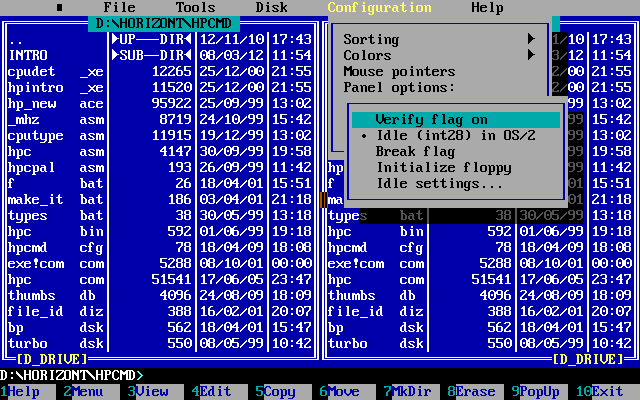tipc
Banned
What language/vendor was it written in ... how many lines of code ... how long did it take you'll ... how many cycles of revision before it was stable.
| VCF West | Aug 01 - 02 2025, | CHM, Mountain View, CA |
| VCF Midwest | Sep 13 - 14 2025, | Schaumburg, IL |
| VCF Montreal | Jan 24 - 25, 2026, | RMC Saint Jean, Montreal, Canada |
| VCF SoCal | Feb 14 - 15, 2026, | Hotel Fera, Orange CA |
| VCF Southwest | May 29 - 31, 2026, | Westin Dallas Fort Worth Airport |
| VCF Southeast | June, 2026 | Atlanta, GA |
What language/vendor was it written in ... how many lines of code ... how long did it take you'll ... how many cycles of revision before it was stable.
I guess it'd have to be this: https://int10h.org/blog/2019/05/fontraption-vga-text-mode-font-editor/
Written in fasm; everything included, it's (...*counts*...) 7334 lines of code, 66 different revisions. :lol: Must've worked on it for 3-4 months on and off.
Professionally? Probably some kind of PDF catalogue generator with Excel sheets as input, written in VBA, but that was years ago so I don't really recall or have the stats anymore.
The bbs software in basic ... that impresses me especially somehow. How did it run?
Of course, "lines" isn't really an ideal comparison.
Real Programmers™ don't write applications--they write systems code.

if Length(PP.curdir)<36 then
pt:=' '+PP.curdir+' '
else pt:=' \...'+Copy(PP.curdir,Length(PP.curdir)-30,31)+' ';
Ptr:=PP.f_ptr;
if PP.vol='' then PP.vol:='No Label';
WriteString(1,cc+(40-length(pt)) div 2,pt,Pal[8]);
WriteString(22,cc+1+(cc*(34-length(PP.vol))) div 40,'['+PP.vol+']',Pal[7]);
if PP.vol='No Label' then PP.vol:='';
{if PP.empty then exit;}
inc(ptr,sizeof(filrec)*row);
for i:=row to n+row do begin
if (i <PP.files) and (not PP.empty) then
begin fname:=ptr^.filename;
{if (ptr^.fileattr and 16) = 0 then StrLwr(fname);}
if (Ptr^.fileattr and 2) <> 0
then fname[1]:=upcase(fname[1]);
if ((Ptr^.fileattr and Hidden) <> 0) and (Pos('.',Fname)>0)
then fname[Pos('.',Fname)+1]:=upcase(fname[Pos('.',Fname)+1]);
SortFIle(fname);
for a := length(fname) to 11 do fname:=fname+' ';
fname:=fname+'│';
if (Ptr^.fileattr and 16) = 0
then Str(Ptr^.filesize:10,pt)
else if fname[1]='.'
then pt:='�UP──-DIR�'
else pt:='�SUB─-DIR�';
fname:=fname+pt+'│';
DateTimeCnv(pt,Ptr^.filedttm);
fname:=fname+pt; {SetFattr}
if Ptr^.selected then WriteString(2+i-row,cc,fname,Pal[1]) else
WriteString(2+i-row,cc,fname,Pal[2]);
inc(ptr,sizeof(filrec));
end
else WriteString(2+i-row,cc,' │ │ │ ',Pal[1]);
end;
end;
procedure Put_File(PP:Panel;cc,row,x:word;active:boolean);
var
fname,pt:string;
{ptr:P_filrec;}
begin
if PP.empty then exit;
ptr:=PP.F_ptr;
inc(ptr,sizeof(filrec)*(row+x));
fname:=ptr^.filename;
{if (ptr^.fileattr and 16) = 0 then StrLwr(fname);}
if (Ptr^.fileattr and 2) <> 0 then fname[1]:=upcase(fname[1]);
if ((Ptr^.fileattr and Hidden) <> 0) and (Pos('.',Fname)>0) then fname[Pos('.',Fname)+1]:=upcase(fname[Pos('.',Fname)+1]);
SortFile(fname);
for a := length(fname) to 11 do fname:=fname+' ';
fname:=fname+'│';
if (Ptr^.fileattr and 16) = 0 then Str(Ptr^.filesize:10,pt)
else if fname[1]='.' then pt:='�UP──-DIR�'
else pt:='�SUB─-DIR�';
fname:=fname+pt+'│';
DateTimeCnv(pt,Ptr^.filedttm);
fname:=fname+pt;
if active
then If Ptr^.selected
then WriteString(2+x,cc,fname,Pal[3])
else WriteString(2+x,cc,fname,Pal[4])
else if Ptr^.selected
then WriteString(2+x,cc,fname,Pal[1])
else WriteString(2+x,cc,fname,Pal[2])The bbs software in basic ... that impresses me especially somehow. How did it run?
Pretty well! When I closed up shop in 1988, one of the members took it over. He was extremely surprised to find that the entire BBS ran off of 4 floppies. He thought for sure I had a rear admiral (which I desperately wanted at the time but could not afford. )
None of us have studied as programmers yet, so there is code like this:
